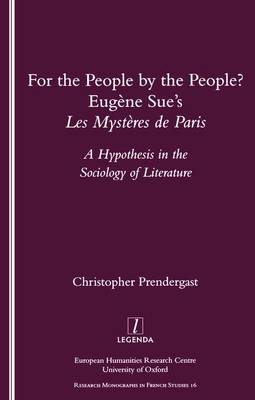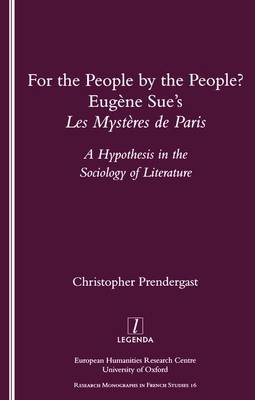
- Afhalen na 1 uur in een winkel met voorraad
- Gratis thuislevering in België vanaf € 30
- Ruim aanbod met 7 miljoen producten
- Afhalen na 1 uur in een winkel met voorraad
- Gratis thuislevering in België vanaf € 30
- Ruim aanbod met 7 miljoen producten
Zoeken
For the People, by the People?
Eugene Sue's Les Mysteres de Paris - A Hypothesis in the Sociology of Literature
Christopher Prendergast
€ 89,45
+ 178 punten
Omschrijving
Eugene Sue (1804-57), like his contemporary Alexandre Dumas pere, was one of the most successful writers of his time. Les Mysteres de Paris, the novel for which he is most remembered, became a publishing sensation. In its serial form, it took the public by storm - readers fought for copies of the next instalment - and in book form its print-run reached an unprecedented 60,000. Christopher Prendergast's study engages with the problematic of emerging forms of popular literature on the basis of a specific hypothesis: that Les Mysteres de Paris, written and published in serial form, was, through the pressure of Sue's reader-correspondents (many of them barely literate), a collective production, 'written by the people for the people'. Prendergast examines the phenomenon of popular literature and reader response in the nineteenth century to illuminate larger issues in the sociology of literature.
Specificaties
Betrokkenen
- Auteur(s):
- Uitgeverij:
Inhoud
- Aantal bladzijden:
- 144
- Taal:
- Engels
- Reeks:
- Reeksnummer:
- nr. 16
Eigenschappen
- Productcode (EAN):
- 9781900755894
- Verschijningsdatum:
- 1/12/2003
- Uitvoering:
- Paperback
- Formaat:
- Trade paperback (VS)
- Afmetingen:
- 137 mm x 218 mm
- Gewicht:
- 244 g

Alleen bij Standaard Boekhandel
+ 178 punten op je klantenkaart van Standaard Boekhandel
Beoordelingen
We publiceren alleen reviews die voldoen aan de voorwaarden voor reviews. Bekijk onze voorwaarden voor reviews.











